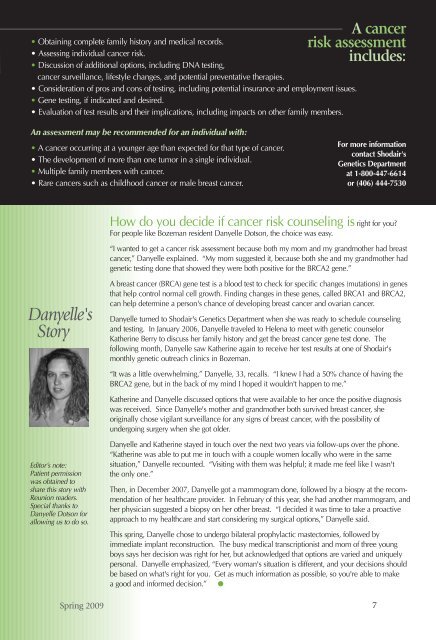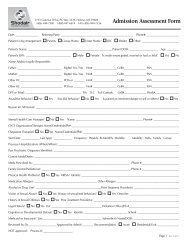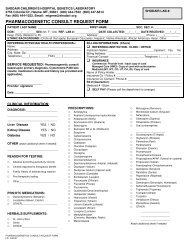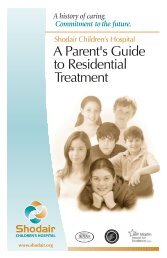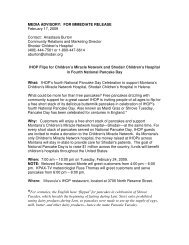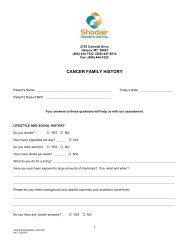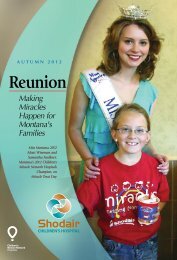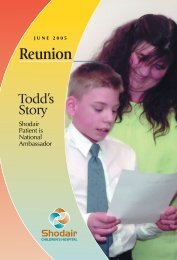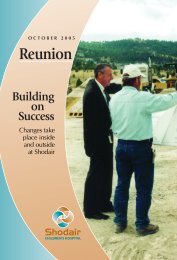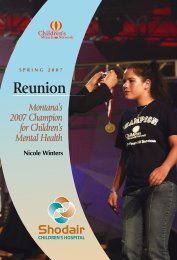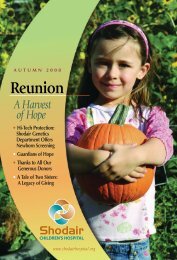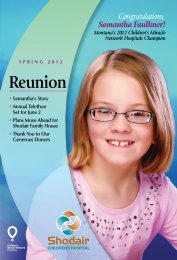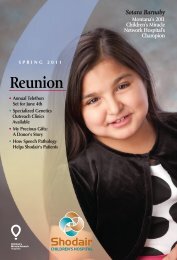SHD Reun 409 - Shodair Children's Hospital
SHD Reun 409 - Shodair Children's Hospital
SHD Reun 409 - Shodair Children's Hospital
Create successful ePaper yourself
Turn your PDF publications into a flip-book with our unique Google optimized e-Paper software.
A cancer<br />
risk assessment<br />
includes:<br />
• Obtaining complete family history and medical records.<br />
• Assessing individual cancer risk.<br />
• Discussion of additional options, including DNA testing,<br />
cancer surveillance, lifestyle changes, and potential preventative therapies.<br />
• Consideration of pros and cons of testing, including potential insurance and employment issues.<br />
• Gene testing, if indicated and desired.<br />
• Evaluation of test results and their implications, including impacts on other family members.<br />
An assessment may be recommended for an individual with:<br />
• A cancer occurring at a younger age than expected for that type of cancer.<br />
• The development of more than one tumor in a single individual.<br />
• Multiple family members with cancer.<br />
• Rare cancers such as childhood cancer or male breast cancer.<br />
For more information<br />
contact <strong>Shodair</strong>'s<br />
Genetics Department<br />
at 1-800-447-6614<br />
or (406) 444-7530<br />
Danyelle's<br />
Story<br />
Editor’s note:<br />
Patient permission<br />
was obtained to<br />
share this story with<br />
<strong>Reun</strong>ion readers.<br />
Special thanks to<br />
Danyelle Dotson for<br />
allowing us to do so.<br />
Spring 2009<br />
How do you decide if cancer risk counseling is right for you?<br />
For people like Bozeman resident Danyelle Dotson, the choice was easy.<br />
“I wanted to get a cancer risk assessment because both my mom and my grandmother had breast<br />
cancer,” Danyelle explained. “My mom suggested it, because both she and my grandmother had<br />
genetic testing done that showed they were both positive for the BRCA2 gene.”<br />
A breast cancer (BRCA) gene test is a blood test to check for specific changes (mutations) in genes<br />
that help control normal cell growth. Finding changes in these genes, called BRCA1 and BRCA2,<br />
can help determine a person's chance of developing breast cancer and ovarian cancer.<br />
Danyelle turned to <strong>Shodair</strong>'s Genetics Department when she was ready to schedule counseling<br />
and testing. In January 2006, Danyelle traveled to Helena to meet with genetic counselor<br />
Katherine Berry to discuss her family history and get the breast cancer gene test done. The<br />
following month, Danyelle saw Katherine again to receive her test results at one of <strong>Shodair</strong>'s<br />
monthly genetic outreach clinics in Bozeman.<br />
“It was a little overwhelming,” Danyelle, 33, recalls. “I knew I had a 50% chance of having the<br />
BRCA2 gene, but in the back of my mind I hoped it wouldn't happen to me.”<br />
Katherine and Danyelle discussed options that were available to her once the positive diagnosis<br />
was received. Since Danyelle's mother and grandmother both survived breast cancer, she<br />
originally chose vigilant surveillance for any signs of breast cancer, with the possibility of<br />
undergoing surgery when she got older.<br />
Danyelle and Katherine stayed in touch over the next two years via follow-ups over the phone.<br />
“Katherine was able to put me in touch with a couple women locally who were in the same<br />
situation,” Danyelle recounted. “Visiting with them was helpful; it made me feel like I wasn't<br />
the only one.”<br />
Then, in December 2007, Danyelle got a mammogram done, followed by a biospy at the recommendation<br />
of her healthcare provider. In February of this year, she had another mammogram, and<br />
her physician suggested a biopsy on her other breast. “I decided it was time to take a proactive<br />
approach to my healthcare and start considering my surgical options,” Danyelle said.<br />
This spring, Danyelle chose to undergo bilateral prophylactic mastectomies, followed by<br />
immediate implant reconstruction. The busy medical transcriptionist and mom of three young<br />
boys says her decision was right for her, but acknowledged that options are varied and uniquely<br />
personal. Danyelle emphasized, “Every woman's situation is different, and your decisions should<br />
be based on what's right for you. Get as much information as possible, so you're able to make<br />
a good and informed decision.”<br />
7


